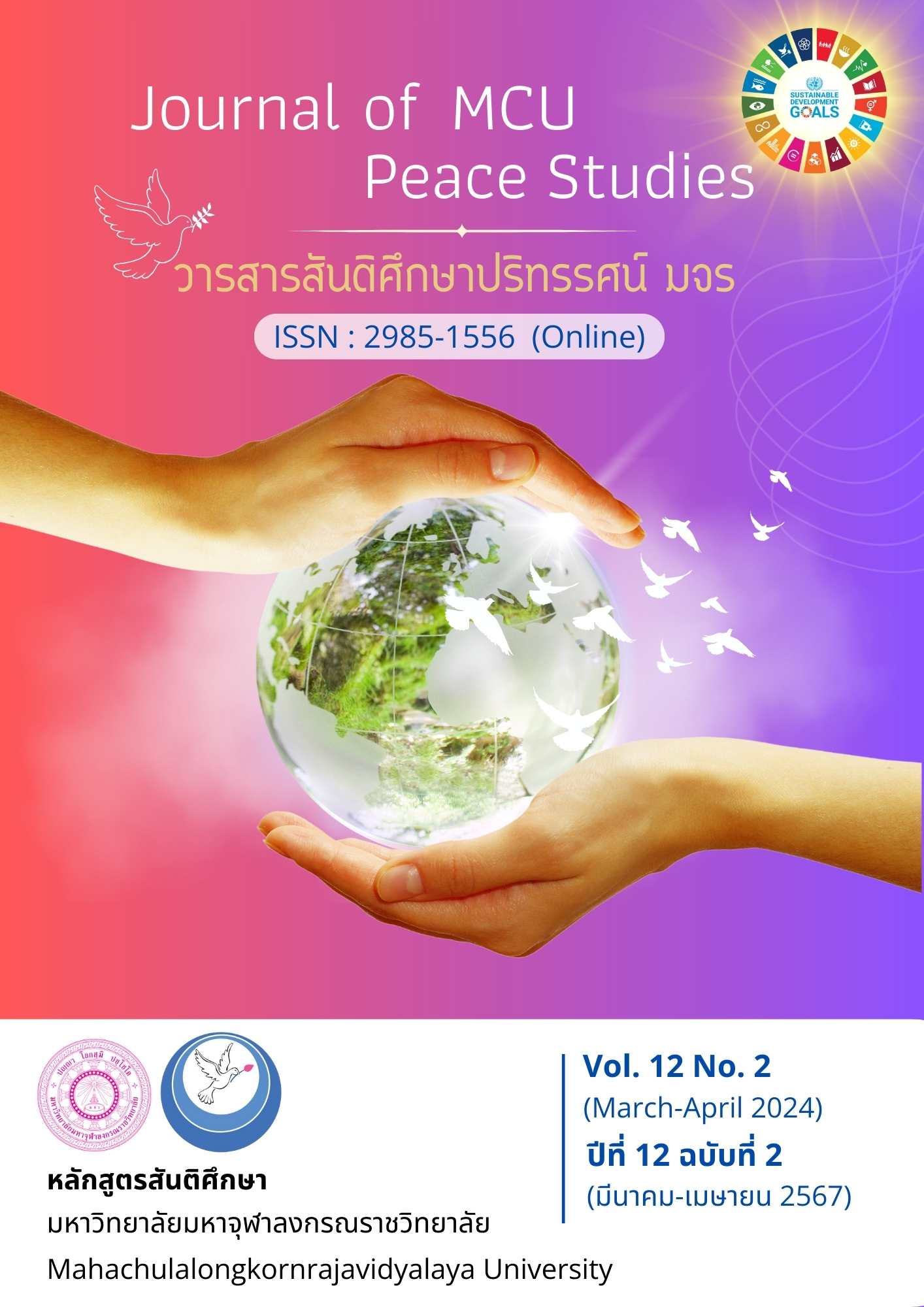Guidelines of Making Khok Nong Na for Household Economic Improvement by Buddhist Peaceful Means of Role Model Farmers Prang Ku District, Sisaket Province
Main Article Content
Abstract
The study consisted of the following objectives: 1) to explore context and factors influencing the development of Khok Nong Na for household economy based on the Buddhist peaceful means of model farmers in Prang Ku district, Sisaket Province; and 2) to present the guidelines for developing Khok Nong Na for household economy based on the Buddhist peaceful means of model farmers in Prang Ku district, Sisaket Province. The study used a qualitative research technique, collecting data through in-depth interviews and observation with key informants separated into two groups of three regular people and three model farmers, for a total of six people. The obtained data were analyzed by inductive method.
From the study, the following results are found: 1) Most agricultural areas lack water, causing cultivation to occur just once a year, resulting in poor family income and family members addicted to gambling; as a result, most farmers face excessive expenditures. Although there are unoccupied areas, they have not been developed or used productively since farmers continue to cultivate in the same fashion and do not change crop cultivation to fit the soil and water requirements of the areas. Farmers' problems in Prangku district include the usage of chemicals in farming, which results in high costs. Model farmers' success in Khok Nong Na is due to their knowledge of air, soil, and water. They spend their money wisely, keep household accounts, and design it to match their requirements. The Iddhipāda (the Four Paths of Accomplishment) are the peaceful Buddhist means that are most suited to the success and sustainability of Khok Nong Na. 2) Model farmers have successfully developed Khok Nong Na using Iddhipāda as the guidelines, which is based on the enhancement of love, efforts, and learning power to develop the areas with mindfulness and wisdom. Model farmers can solve problems of household economy through Khon Nong Na model. The guidelines for applying Iddhipāda with Khok Nong Na are as follows: (1) Chanda (will) by being content and loving at work, resulting in a willingness to work, working joyfully, and not becoming bored or giving up, allowing work to continue and creativity to flourish; (2) Viriya (effort) by being diligent in work without being lazy, having determination to finish work. Those who lack diligence tend to overwork or frequently fail to complete tasks, causing success to be delayed and ineffective; (3) Citta (thoughtfulness) by being determined and focused on one's work. A concentrated mind will remain stable in the face of any problem, allowing the task to go as planned and allowing one to maintain track of the work; and (4) Vīmamsa (investigation) by being analytical in work, which will help one to keep track of and understand the work process, as well as be able to handle problems as they emerge and work successfully within the framework. Without Vīmamsa, a person would lack principles, guidelines, and plans, making it difficult to accomplish success. A body of knowledge from a study is ‘Prang Ku Khok Nong Na’, which consists of the following: mental aspect characterized by love and faith, pride in one's work, sufficiency, and happiness; physical aspect through knowledge of the soil, water, and air, as well as the cost of areas, safe product production, and household accounting; social aspect by having connection and sharing; and wisdom aspect by promoting Khok Nong Na for tourism purposes in order to have agricultural markets which may be used as a learning resource that eventually leads to sustainability.
Article Details

This work is licensed under a Creative Commons Attribution-NonCommercial-NoDerivatives 4.0 International License.
Views and opinions expressed in the articles published by The Journal of MCU Peace Studies, are of responsibility by such authors but not the editors and do not necessarily reflect those of the editors.
References
Chantanee, A., & Changcharoen, Ch. (2020). Buddhism and Sufficiency Economy Philosophy. Journal of Management Science Review, 22(2), 241-250.
Isarangkun Na Ayuthaya, Ch., & Thampiya, P. (2014). Self-sufficiency toward Sustainable Development, Follow in His Majesty's Footsteps. (12th ed.). Bangkok: Amarin Corporations Public Company Limited.
Khetnimit, R. (2023). Farmer of Doo Sub-district. Interview. April, 9.
Naradee, Th. (2023). Farmer of Ku Sub-district. Interview. April, 10.
Phramaha Hansa Dhammahãso, Phrakrupalad Adisak Vajirapañño, Sakabucha, S., & Phophichit, N. (2022). A Model of the “Khok Nong Na” Buddhist Agriculture Development by Peace Studies Model for Sustainable Development: A Case Study of Sisaket Province. Journal of MCU Peace Studies, 10(1), 48-64.
Phramaha Hansa Dhammahãso, Phrakrupalad Adisak Vajirapañño, Sakabucha, S., & Phophichit, N. (2022). Concept of “Khok Nong Na Model” for Sustainable Development. Journal of Arts Management, 6(1), 419-434.
Thaweechat, S. (2023). Farmer of Toom Sub-district. Interview. April, 8.


